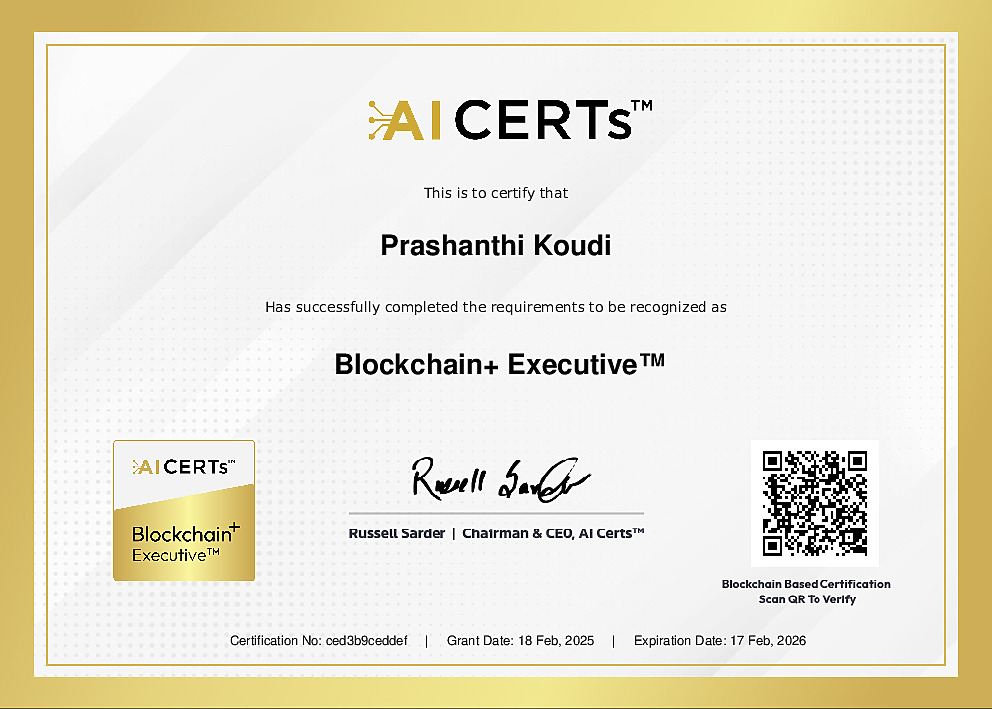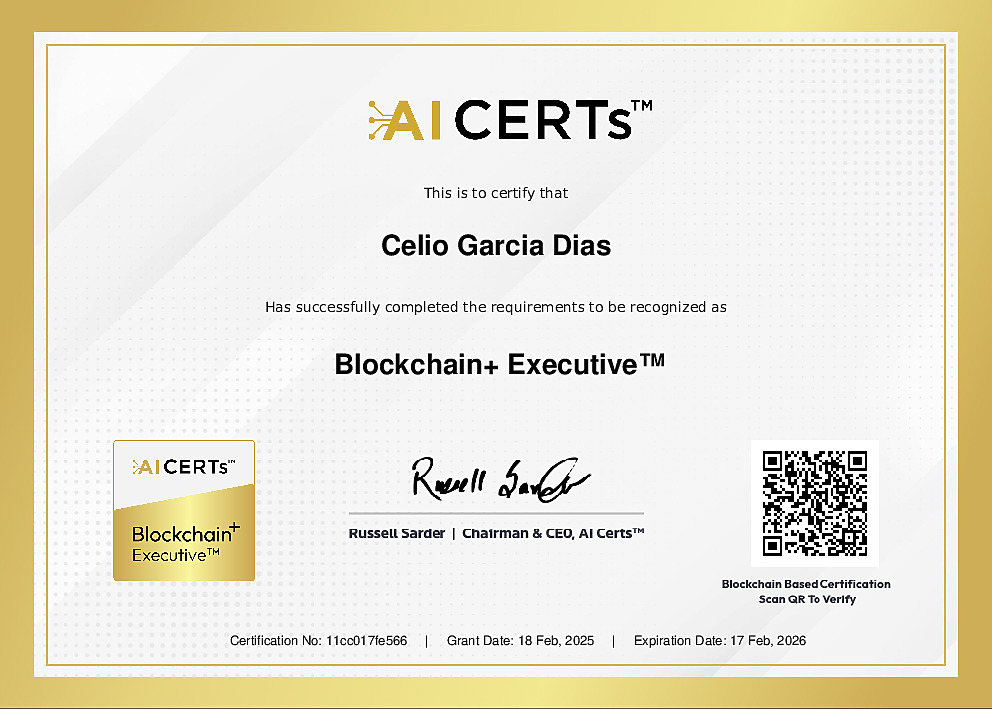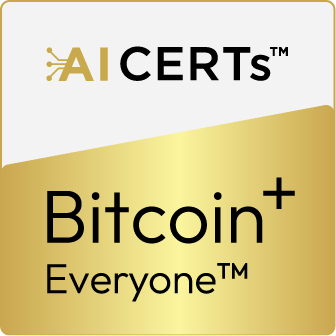Blockchain+ Executive™
BL-100
Lead confidently in the Blockchain executive sphere- Leadership Certification: Master blockchain strategies for executive leadership roles
- Emerging Technologies: Understand trends, synergies, and innovations in blockchain
- Strategic Training: Learn how to lead digital evolution using blockchain insights
Why This Certification Matters
At a Glance: Course + Exam Overview
- Instructor-Led: 1 Day (live or virtual)
- Self-Paced: 6 hours of content

Who Should Enroll
Business Leaders, Managers, and Executives: Leaders seeking to leverage blockchain for business strategy and efficiency.
Financial Professionals: Finance experts needing to understand blockchain’s impact on transactions and investment.
Entrepreneurs and Start-up Founders: Innovators looking to integrate blockchain into new business models.
Investors and Traders: Market professionals interested in blockchain’s effects on trading and investment.
IT and Technology Professionals: Tech experts aiming to explore blockchain’s technical aspects and applications.
Industry Growth: Integrating Blockchain to Boost Trust, Transparency & Efficiency
- The global blockchain market size is projected to reach around $248.9 billion by 2029 with a CAGR of 65.5% during the forecast period. (MarketsandMarkets)
- Industries like finance, supply chain, and healthcare are increasingly adopting blockchain for efficiency and transparency.
- With blockchain's rapid growth, the demand for skilled professionals continues to outpace supply, creating abundant job opportunities.
- Blockchain is increasingly integrated with AI, IoT, and big data, creating innovative solutions across various sectors.
- As governments refine blockchain regulations, professionals with expertise in blockchain’s legal and regulatory aspects are in high demand.

Skills you will gain
- Blockchain Fundamentals Proficiency
- Problem-Solving with Blockchain
- Regulations and Compliance
- Risk Management
What You'll Learn
- Course Introduction
- 1.1 History of Blockchain
- 1.2 Types of Blockchains: Public, Private, Consortium
- 1.3 Components of a Blockchain: Blocks, Transactions, Hashing
- 1.4 Distributed Ledger Technology (DLT)
- 1.5 Consensus Mechanisms: Proof of Work, Proof of Stake, Practical Byzantine Fault Tolerance (PBFT)
- 1.6 Cryptographic Techniques: Hash Functions, Digital Signatures, Merkle Trees
- 2.1 Immutability and Tamper Resistance
- 2.2 Transparency and Auditability
- 2.3 Decentralization and Peer-to-Peer Networking
- 2.4 Tokenization and Digital Assets
- 2.5 Interoperability and Cross-Chain Communication
- 2.6 Scalability and Performance Challenges
- 3.1 Finance: Cryptocurrency, Payment Solutions, Stablecoins
- 3.2 Supply Chain Management: Track and Trace, Counterfeit Prevention
- 3.3 Healthcare: Electronic Health Records (EHRs), Medical Supply Chain
- 3.4 Identity Management: Self-Sovereign Identity, KYC Solutions
- 3.5 Gaming and Entertainment: Non-Fungible Tokens (NFTs), Decentralized Applications (DApps)
- 4.1 Decentralized Finance (DeFi) Platforms
- 4.2 Automated Market Makers (AMMs) and Decentralized Exchanges (DEXs)
- 4.3 Lending Protocols and Yield Farming
- 4.4 Asset Tokenization: Real Estate, Stocks, and Commodities
- 4.5 Central Bank Digital Currencies (CBDCs)
- 4.6 Regulatory Challenges and Compliance Considerations
- 5.1 Transparency and Traceability
- 5.2 Reduced Counterfeiting and Fraud
- 5.3 Efficient Inventory Management
- 5.4 Streamlined Documentation and Compliance
- 5.5 Improved Supply Chain Financing
- 5.6 Enhanced Supplier Relationships
- 5.7 Sustainability and Ethical Sourcing
- 5.8 Supply Chain Resilience and Risk Management
- 5.9 Collaborative Supply Chain Networks
- 5.10 Cost Reduction and Efficiency Gains
- 6.1 Data Security and Integrity
- 6.2 Interoperability and Data Sharing
- 6.3 Patient Empowerment and Control
- 6.4 Streamlined Administrative Processes
- 6.5 Clinical Trials and Research
- 6.6 Fraud Detection and Prevention
- 6.7 Regulatory Compliance
- 6.8 Telemedicine and Remote Patient Monitoring
- 6.9 Enhanced Patient Outcomes
- 7.1 Transparent and Trustworthy Governance
- 7.2 Secure and Efficient Identity Management
- 7.3 Improved Regulatory Compliance
- 7.4 Enhanced Voting Systems
- 7.5 Efficient Tax and Revenue Management
- 7.6 Digital Identity and Credentialing
- 7.7 Enhanced Supply Chain Management
- 7.8 Citizen Engagement and Participation
- 8.1 Regulatory Compliance
- 8.2 Smart Contracts and Legal Validity
- 8.3 Intellectual Property Rights
- 8.4 Data Privacy and Security
- 8.5 Cross-Border Transactions
- 8.6 Tokenization and Securities Regulations
- 8.7 Liability and Accountability
- 8.8 Regulatory Sandboxes and Innovation Hubs
- 8.9 Compliance Technology Solutions
- 8.10 Evolving Regulatory Landscape
- 9.1 Confidentiality Mechanisms
- 9.2 Permissioned vs. Permissionless Blockchains
- 9.3 Smart Contract Security
- 9.4 Immutable Nature of Data
- 9.5 Network Security
- 10.1 Cost Reduction and Efficiency Gains
- 10.2 Revenue Generation Opportunities
- 10.3 Market Disruption and Innovation
- 10.4 Global Trade and Commerce
- 10.5 Financial Inclusion
- 10.6 Capital Formation and Investment
- 10.7 Job Creation and Economic Growth
- 10.8 Risk Management and Resilience
- 10.9 Environmental Sustainability
- 11.1 Scalability Solutions
- 11.2 Decentralized Finance (DeFi)
- 11.3 Non-Fungible Tokens (NFTs)
- 11.4 Blockchain and Internet of Things (IoT)
- 11.5 Regulatory Developments
- 11.6 Environmental Sustainability
- 12.1 Enterprise Use Cases
- 12.2 Project Use Cases
- 12.3 Country/Government Use Cases
Tools You’ll Master

Ganache

Slither

Dune Analytics

CoinGlass
Prerequisites
- Functional understanding of computing processes and open networks like internet.
- Basic knowledge to follow pseudocode to understand a concept.
- Ability to understand how various verticals work like finance, supply chains, asset trading etc.
- Fundamental understanding of how business utilizes information technology for process efficiencies and optimizations.
Exam Details
Duration
90 minutes
Passing Score
70% (35/50)
Format
50 multiple-choice/multiple-response questions
Delivery Method
Online via proctored exam platform (flexible scheduling)
Exam Blueprint:
- Introduction to Blockchain Technology - 6%
- Blockchain Ecosystem Features - 9%
- Real-World Use Cases and Projects -7%
- Blockchain in Finance - 9%
- Blockchain in Supply Chain Management - 9%
- Blockchain in Healthcare - 9%
- Blockchain in Government and Public Services - 9%
- Legal And Regulatory Considerations - 9%
- Privacy and Security in Blockchains - 9%
- Economic Impacts of Blockchains - 9%
- Future Trends in Blockchains - 9%
- Case Studies and Practical Applications - 6%
Choose the Format That Fits Your Schedule
What’s Included (One-Year Subscription + All Updates):
- High-Quality Videos, E-book (PDF & Audio), and Podcasts
- AI Mentor for Personalized Guidance
- Quizzes, Assessments, and Course Resources
- Online Proctored Exam with One Free Retake
- Comprehensive Exam Study Guide
Instructor-Led (Live Virtual/Classroom)
- 1 day of intensive training with live demos.
- Real-time Q&A and peer collaboration
- Led by AI Certified Trainers and delivered through Authorized Training Partners.
Self-Paced Online
- ~6 hours of on-demand video lessons, e-book, and podcasts
- Learn anywhere, anytime, with modular quizzes to track progress
Discover Your Ideal Role-Based Certifications and Programs!
Not sure which certifications to go for? Take our quick assessment to discover the perfect role-based certifications and programs tailored just for you.
Get CertifiedFrequently Asked Questions
The Blockchain+ Executive™ certification offers a comprehensive exploration of blockchain technology and cryptocurrency. Participants delve into topics such as blockchain mechanics, smart contracts, decentralized applications (DApps), real-world applications across various sectors, trading nuances, regulatory landscapes, and future trends.
This certification is perfect for executives, business leaders, technology enthusiasts, and professionals aiming to enhance their knowledge of blockchain's potential impact across industries like finance, supply chain management, healthcare, and government services.
Yes, the certification covers emerging trends and future developments in blockchain technology. This ensures that you stay informed about the latest advancements, making you a valuable asset to employers looking to innovate and stay competitive in the blockchain space.
Executives gain a comprehensive understanding of blockchain technology, cryptocurrency mechanics, smart contracts, and decentralized applications (DApps). They acquire insights into regulatory landscapes, trading strategies, and the potential impact of blockchain on various industries, enhancing their strategic decision-making and leadership capabilities.
Participants explore real-world use cases and projects across various sectors including finance, supply chain management, healthcare, government services, and more. This includes understanding how blockchain enhances transparency, traceability, efficiency, and security in these domains.






